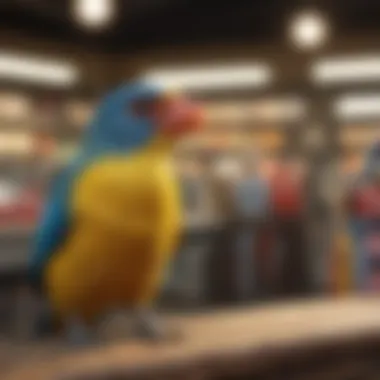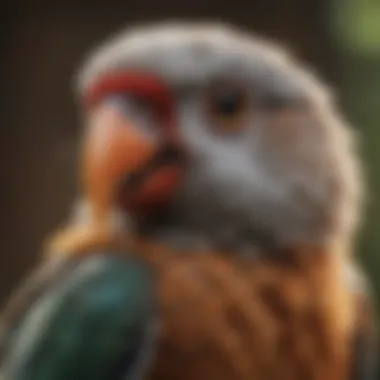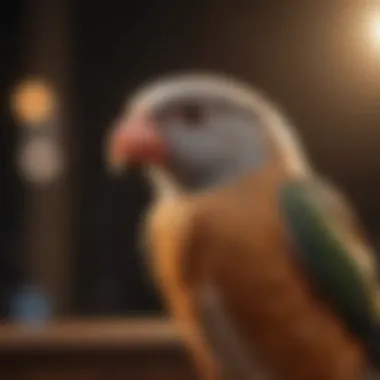Discovering Affordable Pet Birds: Your Ultimate Guide


Intro
Finding an affordable pet bird can introduce individuals and families to the joys of avian companionship. Birds are unique pets that provide delight, engaging behaviors, and peaceful song. However, the cost associated with acquiring a pet bird and making requisite accommodations varies significantly based on various factors. This guide seeks to inform potential owners about different avenues to explore when looking for cost-effective options in pet birds. It offers tips on why it is critical to acquire them ethically and highlights vital aspects of bird care that should not be overlooked along the way.
Avian Care Basics
Proper care is the foundation of adapting successfully to life with a pet bird. Understanding the essentials can significantly raise the quality of life for these creatures.
Importance of Proper Nutrition
Feeding birds, just like humans, necessitates awareness of nutritional needs. A steady diet must consist of seeds, nuts, fresh fruits, and vegetables. Many pet bird owners overlook specialized diets designed for specific bird species. Therefore, thorough research is fundamental in this. Specialty feeds from brands like Kaytee or Harrison's Bird Foods can help bridge the gap between basic foods and wholesome nutrition.
Understanding Bird Species and Their Needs
Different bird species have unique behavioral traits and care requirements. For example, small birds like parakeets or canaries thrive in environments with various toys and perches. In contrast, larger birds like cockatoos generally require more space for their needs and their innate prowess for mischief.
Basics of Birds Habitat Setup
Creating an inviting habitat is critical for the well-being of a pet bird. Begin by choosing an appropriately-sized birdcage that allows for room to move. Introducing natural materials such as sisal rope for climbing, wood branches for perching, and safe toys promotes enrichment. Ensure that water and food containers are accessible yet are kept clean regularly, as this reduces health risks.
Grooming and Hygiene Tips
Birds groom themselves, but owners play an active role in promoting hygiene. Regular nail trimming and occasional baths help to keep their skin healthy. Also, beyond just physical grooming, providing baths can mimic their natural behavior and keep their feathers healthy and clean.
Interacting with Your Pet Bird
Once housed properly, developing a relationship with your bird becomes the next paramount step. Interaction promotes mental stimulation and builds a bond.
Building Trust and Connection
Birds need time to bond with their human caretakers. Slow introductions and patience are vital here. Many birds exhibit curiosity toward new surroundings or people. Building this trust takes time, allowing communication between pet and owner to unfold with grace.
Training Techniques and Tips
Positive reinforcement aids in training birds. Utilizing treats effectively understands limits and capabilities. Birds enjoy learning simple commands as well as tricks, which not only provides amusement but enriches their lives.
Fun Activities for Bird Owners and Their Birds
Dedicated playtime shouldn’t be underestimated. Offering special toys that they can chew on or creating simple obstacle courses makes interaction enjoyable. Engaging in play can significantly benefit birds socially and physically.
Recognizing Bird Cues and Behaviors
Being observant is to a great advantage when caring for a bird. Changes in demeanor can point to issues; thus, reading their body language is integral. For example, a puffed-up feather blanket often indicates stress or uncertainty and requires urgent attention.
Emotional Well-Being of Birds
The emotional health of birds may lead to overall positive behavior and prolonged companionship, warranting careful consideration on the part of the owner.
The Role of Play and Socialization
Birds are inherently social creatures. Regular play breaks isolation while also encouraging natural behaviors. Providing fit regular moments to explore or contact encourages better emotional well-being.
Enhancing Birds' Emotional Health
Recognizing the stressors can elevate the sense of security in a bird's environment. Bird's thrive on interaction and company, so having social stimulation is akin to foundational nourishment toward emotional health.
Assessing Bird Stress and Remedies
Accurate measures help determine when a bird is stressed. Watch for key signs of anxiety. Simple methods such as the inclusion of quieter spaces can be helpful, especially robotics noises or chaos from daily combusts.
Building Strong Human-Bird Bonds


Life-long friendships can emerge when positivity thrives. Establishing consistent schedules can positively impact birds' lives. They often find reassurance in routines understood in processing human actions frequently happening at similar times.
Bird Health and Safety
Health considerations rank high for potential bird old owners. Maintaining good health is enabled by regular checks and preventive methods.
Common Health Issues and Prevention
Common bird health complications include feather-picking or respiratory diseases. Knowledge of potential issues stemming from improper care ensures that an owner minimizes intervention anxiously while improving conditions when new or impending issues arise.
Routine Veterinary Care
Regular vet visits improve preventive health measures. Building rapport with an avian veterinarian can also prepare and object questions during follow-ups.
Environmental Hazards to Avoid
Directly overlooking potential hazards can result in dangerous conditions. Dangers involve chemical pollutants in household upkeep and encounters with small objects they may accidentally consume.
Signs of Illness or Distress
The earlier an illness or distress is recognized, the better the outlook. Changes in eating, significant changes in activity levels, or abnormal feather sizes are warning signs presented to the owner.
Fun Facts and Quirky Insights
Birds display fascinating characteristics that increase marvel about zumicano companionship. Examining these points curtails avoidance and leads owners through a deeper appreciation of their avian pets.
Unique Traits of Popular Bird Species
Species such as African Gray Parrots lean towards vocal capabilities exhibiting semantic utterances that immediately differentiate them from foundational qualities common ground with fellow birds. This remains why they garner significant scholarly attention.
Historical and Cultural Significance of Birds
Various civilizations regard symbolic roles from messenger homing to religious victors. Understanding the origins promotes depth when exploring personal relationships developed between humans and birds.
Famous Bird Owners and Their Stories
Many reputable figures have cherished avians. From naturalists to public personalities, conveying notable friendships leaves enduring contexts that nurture future advancements in relationship-seeking fresh encouragement to owner careers.
Exploring various pathways in seeking-out affordable pet birds entails not just frugal choices but a profound consideration of various areas relating to care in tandem with identifying species; each adds significant structure to successful pet ownership.
Understanding the Landscape of Pet Bird Ownership
Understanding the landscape of pet bird ownership is essential for anyone considering welcoming a feathered friend into their home. Pet birds are more than just beautiful creatures; they are intelligent companions that require time, care, and commitment. Knowing the realities of bird ownership can prepare potential owners to make informed decisions.
The first element to consider is the appeal of pet birds. Many are drawn to the vibrant colors and playful personalities of birds. Unlike many traditional pets, such as dogs and cats, birds offer unique traits. They are known for their ability to mimic sounds and engage with their owners in dynamic ways. These attributes contribute strongly to their attractiveness as pets. Moreover, they often need less space compared to larger pets, making them an appealing choice for people in smaller living situations.
Key considerations surrounding pet birds include their intelligence and social needs. Birds thrive on interaction, and prospective owners must analyze their lifestyle. Can they provide the social engagement these pets demand? Additionally, the financial implications cannot be ignored. Birds require proper housing, specialized diets, and occasional veterinary care. Therefore, having a clear understanding of responsibilities and expenses associated with bird ownership sets a responsible framework for adoption.
The Appeal of Pet Birds
Pet birds have a profound lure for many. They can brighten up a home and become perfect companions. Various bird types cater to different lifestyles and preferences. Each species has distinct behaviors and visual characteristics that might attract potential owners.
Birds, especially smaller species, tend to bond closely with their owners. Interaction enhances this bond, making the experience more fulfilling. The unique charm & delight they contribute to daily activities is important in the lives of their caregivers.
Common Species of Pet Birds
In the realm of pet birds, there are several species favored by owners. Understanding the different types can enhance selection and ownership experience. The most common species each bring their traits, which may align differently with various owners' lifestyles.
Parakeets
Parakeets, also known as budgerigars, are among the most popular choices for new bird owners. Their small size, social nature, and relatively easy care contribute to their widespread attraction. Parakeets are known for their bright plumage, especially in shades of green and yellow, and ability to sing.


What makes parakeets a good choice? They are generally cheaper compared to more exotic species. Moreover, they can learn to talk with consistent verbal interactions, which can be very rewarding. However, owners must also know they benefit from companionship with other parakeets. A single parakeet may feel lonely if it does not receive enough attention from its human caregiver.
Cockatiels
Cockatiels stand out due to their friendly nature and engaging personalities. They are known for a quirky charm and can also mimic sounds, which several bird lovers find delightful. Often, their umbrellastyle crest adds character, appealing to many bird enthusiasts.
They can fit seamlessly into family environments. However, potential owners must consider their somewhat larger care space needs compared to parakeets. An adequate size cage and daily out-of-cage time become vital for their well-being and happiness. Their level of interaction and suitability for both families and individuals plays a critical role in making them popular.
Lovebirds
Lovebirds have garnered a reputation for being affectionate and social. Their small size and vibrantly colored feathers add to their charm. They often thrive in pairs, which is worth considering for prospective buyers looking for a lively bird.
Though they form deep bonds with their owners, they might also bond with other lovebirds. Given their necessity for social interactions, having more than one can lead to richer experiences but might complicate ownership considerations.
Canaries
Canaries possess a unique appeal due to their beautiful singing abilities. These birds require relatively less interaction than others, which may suit certain lifestyles, especially for those who may have limited time. Their cheerful songs enrich the ambiance of a home, which can provide liveliness throughout the day.
However, the downside lies in the need for a companion within nature that they may miss if kept alone. This aspect must be balanced based on a bird owner's ability and willingness to provide companionship.
Finches
Finches are often choreography-filled marvels in the avian world with their vibrant colors and active behavior. They prefer living in groups, aligning perfectly for eye-catching aviaries. Generally less demanding in terms of handling, they enchant many without strict needs for extensive human interaction.
Financially, finches can be affordable to maintain as they enjoy eating seeds that are easily acquirable. However, this lax caring standards may result in potential limitations on bonding opportunities between the birds and owners.
Exploring Local Sources for Affordable Birds
Finding the right source to purchase a pet bird is essential for ensuring that you get a vibrant, healthy companion without overspending. The investigation into local sources can uncover various both affordable options and a multitude of benefits. Whether you opt for a local pet store, a reputable breeder, a bird rescue organization, or an online marketplace, understanding the pros and cons of each venue is crucial. This comprehensive examination will guide you toward making a well-informed decision that fits your budget while also ensuring the ethical treatment of these lively creatures.
Pet Stores
Identifying Budget-Friendly Stores
Finding budget-friendly pet stores can be a straightforward process if you know where to look. These stores often offer a range of birds at reasonable prices, making them an attractive option for potential owners. Notably, these shops may run promotions or discounts, enabling buyers to acquire birds without breaking the bank.
One key characteristic of budget-friendly pet stores is their focus on a variety of avian species. Often, they will carry widely available breeds like parakeets and canaries. The attractiveness of these stores lies in the combination of lower upfront costs and the chance to interact with birds in person. This reduces the uncertainty that online shopping may introduce, such as risks associated with shipping or disease exposure.
However, there are challenges. Not all budget-friendly stores provide the same level of care, and the condition of the birds should always be assessed. Researching reviews or visiting Mulicity can help distinguish the good from the subpar.
Assessing Your Bird Ownership Readiness
Assessing your bird ownership readiness is vital for potential pet bird parents. Birds are living beings who require a lot of attention and commitment. This readiness assessment covers several crucial aspects: the initial setup costs, ongoing care needs, and your lifestyle compatibility.
Being rpmperly prepared ensures that you provide a healthy environment for your new pet and fully understand your responsibilities, preventing potential issues that might arise in the future.
Initial Costs of Bird Ownership
Cage Setup and Supplies
One of the first costs you will face is the cage setup, which is crucial for your bird's health. A suitable cage should be spacious enough for the bird to move freely and spread its wings. The key characteristics to consider here include material quality and add-ons like perches, food bowls, and toys.
Cages come in various sizes, and it's essential to match the size with the type of bird. For example, larger breeds like cockatoos need more space than smaller ones such as finches. Additionally, investing in high-quality materials saves money in the long run. Using low-quality cages can result in frequent replacements.
Some examples of popular choices are stainless steel cages. They offer durability and are easier to clean compared to other materials. However, cost might be a drawback as they tend to be more expensive.


Nutritional Needs
Caring for your bird also involves understanding its nutritional needs. Proper nutrition sharply affects your bird's long-term health. Each species may have different dietary needs, varying from pellets, seeds, fruits to vegetables. Being aware of this can help guide your purchase decisions.
The key characteristic is balanced diets. Popular diets for many common species like parakeets and lovebirds include commercially-prepared pellets that provide essential nutrients. They often feature terminations that ideally suit different stages of a bird's life.
However, creating a balanced diet might be disadvantageous because some species might resist change. Moreover, healthier alternatives can be pricy if you choose them without planning.
Long-Term Care Considerations
Veterinary Care
Veterinary care is a critical component of responsible bird ownership. Having access to avian veterinarians ensures early detection of any health issues and regular check-ups, contributing significantly to a bird's life span. Knowing the costs associated with routine exams, vaccinations, and potential emergencies is fundamental.
It's also preferable to establish a relationship with a vet before bringing your bird home, to seamlessly address future health concerns. Expect to invest in yearly check-ups and consultations, often ranging between 50 to 100 dollars per visit. This might seem steep, but the benefit of ongoing veterinary care far exceeds the costs.
Daily Enrichment and Attention
Daily enrichment activities and social interactions are crucial for a bird’s mental well-being. Birds are intelligent creatures that require engagement to prevent boredom, which can lead to behavioral issues. Providing interactive toys and spending dedicated time for training sessions are practical outlets for their energy.
A key characteristic of fruitful daily attention is its impact on behavior. Frequent interaction reduces anxiety and promotes a bond with the owner. Different species may require various amounts of interaction, but certainly, neglect leads to behavioral issues.
However, consider the time commitment. The inconsistency in securing the required time for interaction may destabilize your relationship with the pet real quick.
Ultimately, assessing your readiness for bird ownership is a foundational step for a rewarding experience. Understanding the financial、小』long-term commitment respected ensures that both you and your new bird can thrive together.
Ethical Considerations in Bird Acquisition
Ethical aspects related to bird acquisition plays a critical role in the journey of potential bird owners. Choosing to obtain a pet bird from an ethical source reflects a commitment not just to the animal but also indirectly promotes responsible practices within the industry. The process requires awareness of where the birds come from, how the birds have been bred, and the conditions in which they are kept.
Sourcing responsibly ensures that the birds have not suffered from overbreeding or rangeless captivity. Furthermore, ethical consideration encourages adoption from rescues rather than purchase from questionable breeders or pet stores. Responsible choices impact overall welfare within the bird community and ensure that prospective owners welcome a healthy and well-adjusted pet into their homes.
Importance of Ethical Sourcing
Ethical sourcing informs the decision-making of potential owners by emphasizing the importance of a healthy environment for birds. Birds should be sourced from reputable breeders who prioritize health and humane living conditions, or from local shelters. Each option has unique benefits that can enhance the overall experience of ownership.
Purchasing from ethical sources often guarantees better care and health for animals. New avian parents can track the lineage of their birds, gain support from breeders, and receive vital aquiring care guides. This approach reduces risks associated with purchasing via unknown means and ensures overall responsible ownership.
Understanding Bird Legislation
Local Laws and Regulations
Local laws are put in place to maintain order and support ethical practices regarding bird ownership. Comprehension of these laws aids in the establishment of responsible ownership by guaranteeing the bird’s welfare and focusing toward promoting awareness about native species. Failure to adhere to local laws could result in significant fines, punishments, but most importantly, a negative impact on local fauna. Therefore, compliance turns out favorable in building a community focused on proper care.
The unique feature lies in the consideration of various regional regulations that adjust the scope-specific to each area, making it a significant aspect of determining responsibility in ownership. Additionally, understanding these regulations reinforces a communal consciousness about local ecology and habitats.
Preventing Illegal Trade
Preventing illegal trade directly aids in the battle against unethical practices in the pet industry. Gaining insights into how birds are sourced helps extraordinary burst of appreciation toward reputed sellers. When both local laws and breeding customs are adhered to, the nature of competition in the market shifts.
The pros emphasize a successful demand for legitimate sources in terms of improved health and better psychological documentation of birds' origins. It strengthens the wildlife community against poachers or green-lit sellers who prioritize profits over sustainable breeding concepts.
Navigating through these murky waters can truly bear a healthy garden for bird owners formed potentially to stand affront illegal utilities causing threats to natural species. In the end, harmonious protocols have evidently shaped local lifelines toward providing financial and other content in threatens industry boundaries ensuring sustainable behavioral ownership.
Epilogue and Final Thoughts
Navigating the path towards finding affordable pet birds requires careful thought and intentionality. This article has provided an intricate lens into the many factors that hopeful bird parents need to consider. From identifying suitable local sources, such as pet stores and breeders, to understanding the deeper meanings of ethical sourcing, this comprehensive guide interconnected various strands of pet bird ownership.
Importance of Source
The first takeaway emphasizes the various sources available for acquiring birds. Each modality, whether it be local gent stores or bird rescue organizations, carries its own significance. It ensures potential owners assess cost, breeding standards, and welfare implications.
Considerations Beyond Cost
Another key element pertains to the costs of pet bird ownership. It is easy to focus solely on upfront expenses, like cages, but the long-term fiscal responsibilities often go overlooked. Ongoing necessities such as veterinary care and recreational activities play a fundamental role in the life of a pet bird, thus guiding a more holistic understanding of bird care.
"Be sure to treat your pet bird not just as a companion, but as a family member who deserves the same level of care and attention as anyone else in your home."
Ethics Above All
In addition to financial aspects, ethical considerations spark a necessary dialogue among potential bird owners. Understanding legislation and committing to practice planet-friendly actions, like preventing illegal trade, establishes the foundation for responsible ownership. Insight into these themes not only enriches the lives of our cherished birds but fortifies our values as caretakers.
Final Insights
Affordability does not equate to compromised quality. It is possible to find a loving pet bird without financial strain. Educated decisions heterogeneously intertwine passion and fiscal capacity. Aspiring bird parents are encouraged to engage deeply with the intricacies of pet ownership, ensuring adherence to ethical standards while nurturing strong, sustained bonds with their birds. Each aspect—from cost to care—holds weight in the overall experience.%















